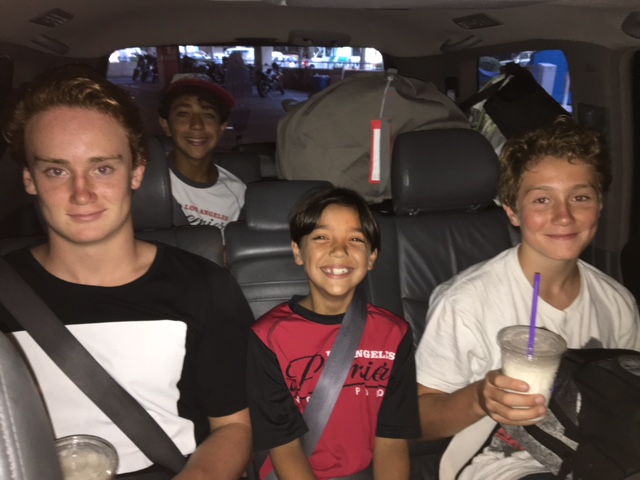It wasn’t until I was watching the plane carrying my two sons speed away from Barcelona airport that it really hit me.
My boys, who had what I felt was a pretty sheltered European childhood, were heading straight for Los Angeles—on their own. Sure, this is a city full of amazing opportunities, but Hollywood has made certain we are all too familiar with its darker side. As the plane disappeared a series of L.A. film scenes flitted through my mind: streetsmart teens dealing drugs out of school lockers, random drive by shootings and bullies pushing kids around the school corridors.
RELATED: Here Goes, I'm Moving Abroad With My Kids
While our whole family was moving to America, the boys, ages 14 and 12, had flown ahead as they were playing in the water polo Junior Olympics and training started before my husband and I could leave Spain. Realizing a new team would give them an instant opportunity to make friends and feel part of their new home, I ignored the gnawing doubts about how my mollycoddled European kids would cope and packed them off.
It turns out I didn't have to worry.
Within an hour of landing in L.A. the incredibly generous family hosting the boys sent photos of them with their first shakes from In-N-Out Burger. They couldn’t have looked more content. And when I finally got the kids to call me (I had to ask their host mom to remind them) they were so happy that they really didn't have time to talk.

> 'No one here can go anywhere without their Mum or Dad driving them,' scoffed my eldest.
“Look, Mum, don’t WORRY” said my eldest. “Everyone is really friendly here. OK, I’ve got to go, too.” A swarm of neighborhood kids was apparently waiting to do something much more important than talking to your mom.
A couple of weeks after my husband and I arrived with our youngest son, so about a month after the older kids landed, I asked if they still thought Americans were friendlier than Europeans. “Definitely,” they said without hesitation.
It led to a conversation about what the kids saw as the big differences between Europe and America.
- "Pretty much everyone is nice."
“Not just the waiters and the people who are paid to be friendly,” said my youngest, who had been fascinated by the over-attention he’d received from American waiters.
“It’s not that they’re nicer,” said my middle son, ever loyal to his Spanish roots. “It’s just that they’re friendly from the beginning. It’s like they just assume they’re going to like you, not like in Barcelona, where people already have their friends and you have to kind of work your way in.”
- European kids have more independence.
It turns out the kids thought my idea of Americans being street smart doesn’t hold up, or not in the suburbs of L.A. where we live anyway. “No one here can go anywhere without their Mum or Dad driving them,” scoffed my eldest, who has been taking the metro to school by himself for years.
In fact, according to my kids, their European friends are more street smart than the kids they know in L.A., as they are used to getting around on their own on public transport or on foot. My boys, who grew up walking everywhere, were fascinated by L.A.’s car culture. When we first tried to walk down to the store my youngest turned a corner and announced “You’re not going to believe it but there’s actually not any pavement here!” We trooped on for a few minutes, dodging cars and feeling increasingly ridiculous, before going back for the car.
While the kids love the comfort factor of being driven everywhere, they realize this means they have less independence. It’s a shock as they’re used to making their own plans, knowing they could walk, bus or metro almost anywhere. So now my 14-year-old is looking forward to driving (in less than a year!) Because I'm used to a legal driving age of 18, this is almost unthinkable for me.
- It's easier to be social in Barcelona.
The other result of people in Barcelona walking everywhere is that everyone is always outside, so you always run into people you know. So many Europeans live in small flats that they want to escape at the end of the day, plus we didn't have the space to invite people over. So everyone organizes to meet in the local square or the local park. It’s very easy to be social.
A few days after starting school my youngest said a kid in his class wanted to come over for a playdate, which made him feel a bit nervous. “It’s easier in Barcelona if everyone just goes out to the park together,” he said.
- People in the U.S. eat out all the time.
Fast food really hasn't taken off in Europe, at least not to the extent it has here. They were amazed by the vast array of it, and delighted by the idea of drive-thrus.
Trying to describe the differences, my middle son said “In Spain, when you go out to a restaurant, its a big thing, you go with the whole family, and maybe your grandparents and you sit down and eat a three course meal. Here everyone just seems to eat out all the time.”
- American kids have packed lunches—and it's the best thing ever.
Another very different way of eating here in the U.S. is one the boys love. My youngest said he thought it might be the best thing about America. The fact you can take a packed lunch is a huge liberation for kids who have been brought up on the Spanish lunch tradition. There, everyone sits down for a three course meal, staring with salad and ending with fruit. While it’s great for parents to know their kids have had a sound meal in the middle of the day, the kid generally hated having no choice in what they eat.
RELATED: British vs. American Parenting Terms: Who Does It Better?
Which brings me to the thing the kids love most about the U.S.
- U.S. kids have shorter school days.
Accustomed to a 9-to-5 school day starting at 3 years of age, my youngest is reveling in his 8:15 a.m. to 2:40 p.m. timetable; even the older kids are happy to leave school at 3. Who wouldn't love a country that gives kids the afternoons off?




